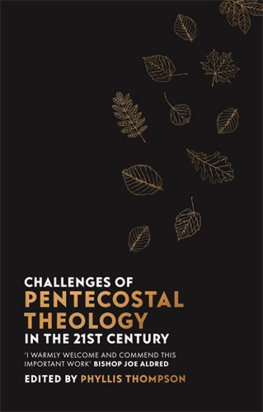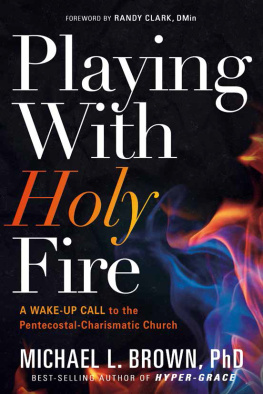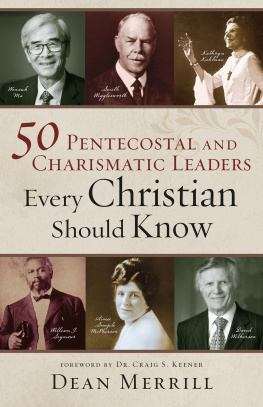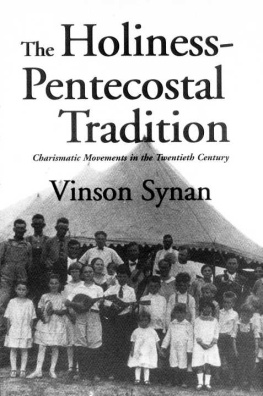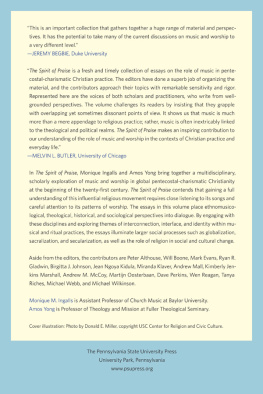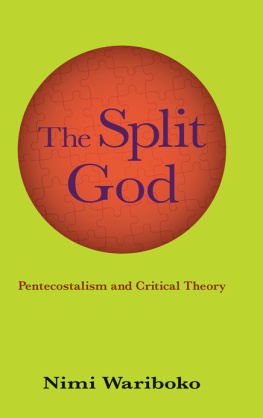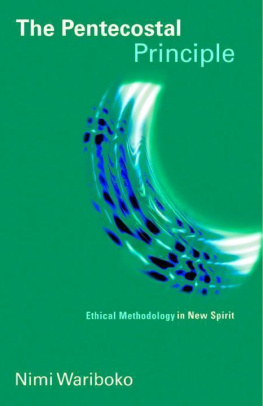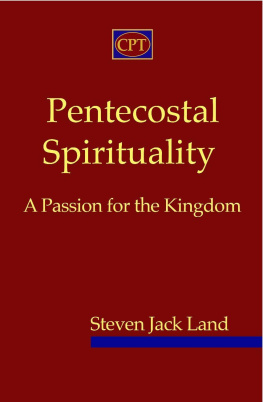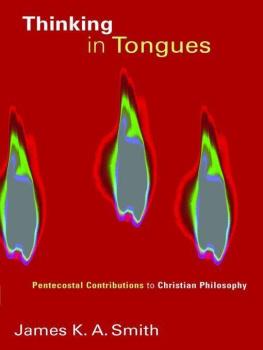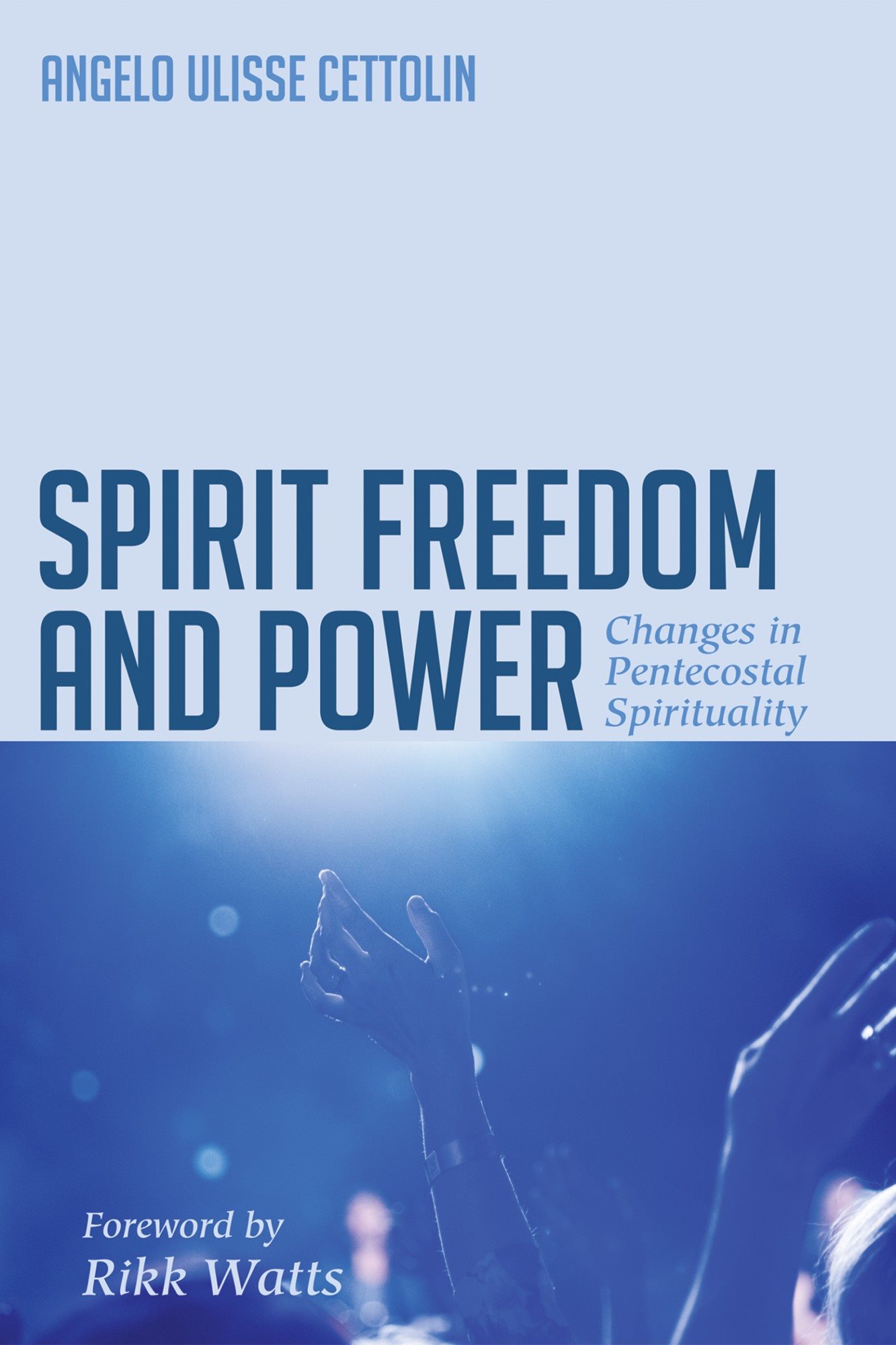Spirit Freedom and Power
Changes in Pentecostal Spirituality
Angelo Ulisse Cettolin
Foreword by Rikk Watts
Spirit Freedom and Power
Changes in Pentecostal Spirituality
Copyright 2016 Angelo Ulisse Cettolin. All rights reserved. Except for brief quotations in critical publications or reviews, no part of this book may be reproduced in any manner without prior written permission from the publisher. Write: Permissions, Wipf and Stock Publishers, 199 W. 8th Ave., Suite 3, Eugene, OR 97401.
Wipf & Stock
An Imprint of Wipf and Stock Publishers
W. th Ave., Suite
Eugene, OR 97401
www.wipfandstock.com
paperback isbn: 978-1-4982-9373-0
hardcover isbn: 978-1-4982-9375-4
ebook isbn: 978-1-4982-9374-7
Manufactured in the U.S.A.
All Scripture quotations, unless otherwise indicated, are taken from the Holy Bible, New International Version, NIV. Copyright 1973 , 1978 , 1984 , 2011 by Biblica, Inc. Used by permission of Zondervan. All rights reserved worldwide. www.zondervan.com The NIV and New International Version are trademarks registered in the United States Patent and Trademark Office by Biblica, Inc.
Scripture quotations are taken from the Holy Bible, New Living Translation, copyright 1996 , 2004 , 2007 , 2013 , 2015 by Tyndale House Foundation. Used by permission of Tyndale House Publishers, Inc., Carol Stream, Illinois 60188 . All rights reserved.
This book is dedicated to my wife, Robbie, who has supported me in many ways through countless hours of both research and production. I also want to thank my family members, Joseph, Ursula, Jayson and Evangeline, for their good humor and encouragement.
Preface
W hile at times I have made critiques of the contemporary church, I love and am personally committed to the local church. I have a passion to see the church be all that God intends and gifted her to be. Finally, while much of the conversations in this book are about the Holy Spirit my goal is also to please my Father God and the Lord Jesus Christ. My prayer is that you, the reader, will be stirred to seek after all things of the Spirit that have been promised to us in Holy Scripture.
Acknowledgments
I wish to thank my academic colleagues and staff at Eastern College, Australia, who deserve special mention for their personal support, particularly Principal Dr. Cheryl McCallum, Dr. David Morgan, Rev. Cheryl Osment, Rev. Dr. Jeff Pugh, Dr. Tom Edwards, Dr. Art Wouters, Dr. Michelle Sanders, Steve Bradbury, Rika Mason, Ps. Glenn Tweedie, Dr. Andrew Schmidt, Neil Horvath, Sue Grechko, Sarah Michaels, Aaron Garth, and Rohan Edmeades. I also wish to thank my colleagues at Harvest Bible College for their encouragement, particularly Dr. Brendan Roach, Dr. Jon Newton, Dr. Ian Grant, Dr. Phillip Hughes, and Grant Buchanan.
Introduction
T he Pentecostal movement in the Christian church emerged at the turn of the twentieth century emphasizing the need for believers to have an authentic and powerful experience of the Holy Spiritthis was evidenced by speaking in tongues (or glossolalia). It passionately advocated the return to a pristine early Christianity in which empowerment by the Spirit was seen as essential and part of the normal Christian life. More recently, however, some Pentecostal and Charismatic movements are playing down features of historic or classical Pentecostalism and moving toward more traditional or mainline expressions of the Christian life in their practices and beliefs.
Sociologists have proposed that as organizations, such as churches, develop they tend to become more structured, moving away from spontaneity toward more order and routine. Tensions begin to develop between the institution and charismatic freedom. It seems that in the Western world pressures from growing institutionalization and modernity is leading to a change in the spirituality of Pentecostal leaders and their churches.
I went on a search to discover whether this was really the situation in my own context, and if so what the ramifications might be. My concern was for Pentecostals to retain their radical edge, being faithful to their historic roots, and yet still develop a mature and relevant spirituality for this present day and age. Is it possible for pastors and leaders to have ringing in their ears the sounds of early Pentecostalism, while still interfacing with the changing context of a complex postmodern cultural milieu in the twenty-first century? Could there also be any lessons here for all Christians, of whatever persuasion, about their current spiritual practices? While todays Pentecostal spirituality is certainly shaped by classical early Pentecostal expressions, did it need to develop in some way to remain dynamic and vibrant?
To answer these questions the nature of Pentecostal spirituality needed to be uncovered. Scholars have acknowledged a distinctive Pentecostal or Charismatic spirituality, but there was no consistency in defining its characteristic features. The term Pentecostal/Charismatic is often used synonymously. The view adopted here is that the classical Pentecostal movement is based in the revival at the turn of the twentieth century and the neo-Pentecostal or Charismatic(renewal) movement is of the second half of the twentieth century two waves within the one larger movement. Pentecostal churches can represent both. Of particular importance to them is a crisis-type second blessing experience after conversion, often referred to as the baptism in the Holy Spirit, which is evidenced by speaking in tongues. From the 1960 s until recent times, the term Charismatic was used of those who held to the same second blessing experience but generally chose to remain within their non-Pentecostal churches. Since the s, evangelicals of the Third Wave movement, while they do not classify themselves as either Pentecostal or Charismatic, hold to the validity of the gifts of the Spirit but do not require a climactic second blessing experience evidenced by speaking in tongues. More recently, the term Charismatic or Neo-Pentecostal has been used to describe those that hold to the validity and use of the gifts of the Spirit for today but do not mandate the requirement of speaking in tongues to validate their experience of the Spirit. All four streams have influenced Pentecostal churches and ministers including the Assemblies of God in Australia, also known as Australian Christian Churches (AoG/ACC), and proponents of all the approaches are represented within these churches.
In chapter , we will explore what Christians mean by spirituality in general and in comparison with the more secular use of this term. For Christians, spirituality is more than just a human quest or journey. It is an attraction to things of the Spirit and the conscious living of a Christian way of life empowered by the Holy Spirit. Pentecostal spirituality, as one form of Christian spirituality, particularly emphasizes Gods Spirit working in the process of sanctification and empowerment for ministry. However, the essential nature of Pentecostal/Charismatic spirituality is wider than what is described in Pentecostal theology and this required some empirical observation and analysis.
In chapter , the origins and developments of Pentecostalism are outlined and what particularly distinguished the Pentecostal understanding of the Christian life. Various views are surveyed in chapter to distill the essential features of Pentecostal spirituality. Remarkably there is considerable consistency despite the varied global phenomena. At the heart of the diverse Pentecostal spiritualities there is a shared experience of the Holy Spirit and a practice of the spiritual gifts that unifies this global diversity.


